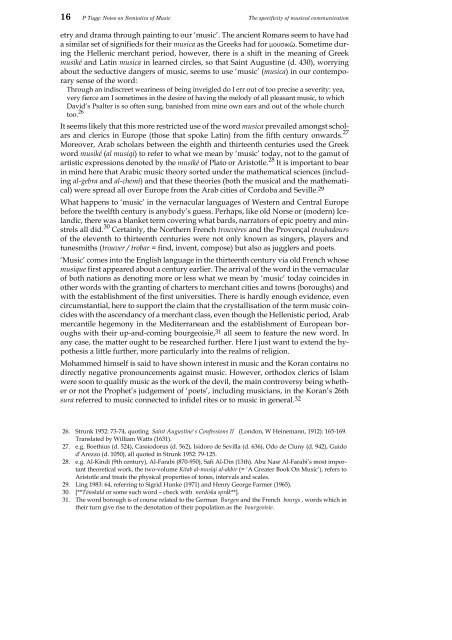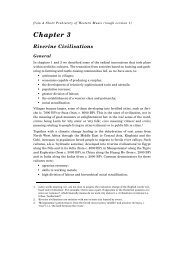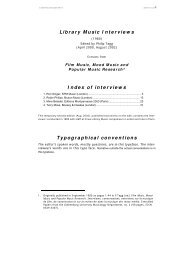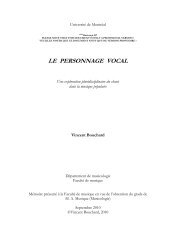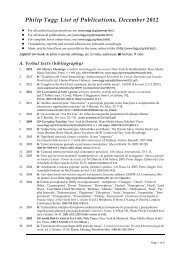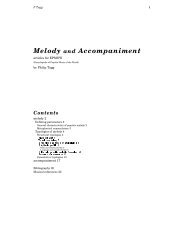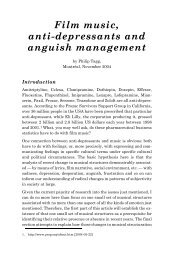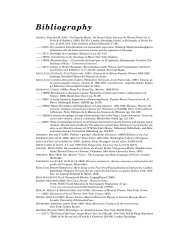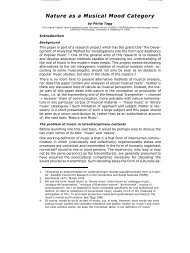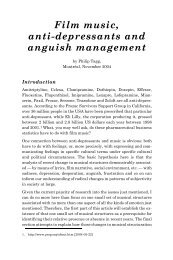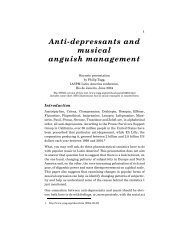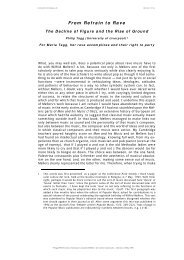Introductory notes to the Semiotics of Music - Philip Tagg's home page
Introductory notes to the Semiotics of Music - Philip Tagg's home page
Introductory notes to the Semiotics of Music - Philip Tagg's home page
You also want an ePaper? Increase the reach of your titles
YUMPU automatically turns print PDFs into web optimized ePapers that Google loves.
16 P Tagg: Notes on <strong>Semiotics</strong> <strong>of</strong> <strong>Music</strong> The specificity <strong>of</strong> musical communication<br />
etry and drama through painting <strong>to</strong> our ‘music’. The ancient Romans seem <strong>to</strong> have had<br />
a similar set <strong>of</strong> signifieds for <strong>the</strong>ir musica as <strong>the</strong> Greeks had for mousik∆. Sometime during<br />
<strong>the</strong> Hellenic merchant period, however, <strong>the</strong>re is a shift in <strong>the</strong> meaning <strong>of</strong> Greek<br />
musiké and Latin musica in learned circles, so that Saint Augustine (d. 430), worrying<br />
about <strong>the</strong> seductive dangers <strong>of</strong> music, seems <strong>to</strong> use ‘music’ (musica) in our contemporary<br />
sense <strong>of</strong> <strong>the</strong> word:<br />
Through an indiscreet weariness <strong>of</strong> being inveigled do I err out <strong>of</strong> <strong>to</strong>o precise a severity: yea,<br />
very fierce am I sometimes in <strong>the</strong> desire <strong>of</strong> having <strong>the</strong> melody <strong>of</strong> all pleasant music, <strong>to</strong> which<br />
David’s Psalter is so <strong>of</strong>ten sung, banished from mine own ears and out <strong>of</strong> <strong>the</strong> whole church<br />
<strong>to</strong>o. 26<br />
It seems likely that this more restricted use <strong>of</strong> <strong>the</strong> word musica prevailed amongst scholars<br />
and clerics in Europe (those that spoke Latin) from <strong>the</strong> fifth century onwards. 27<br />
Moreover, Arab scholars between <strong>the</strong> eighth and thirteenth centuries used <strong>the</strong> Greek<br />
word musiké (al musiqi) <strong>to</strong> refer <strong>to</strong> what we mean by ‘music’ <strong>to</strong>day, not <strong>to</strong> <strong>the</strong> gamut <strong>of</strong><br />
artistic expressions denoted by <strong>the</strong> musiké <strong>of</strong> Pla<strong>to</strong> or Aris<strong>to</strong>tle. 28 It is important <strong>to</strong> bear<br />
in mind here that Arabic music <strong>the</strong>ory sorted under <strong>the</strong> ma<strong>the</strong>matical sciences (including<br />
al-gebra and al-chemi) and that <strong>the</strong>se <strong>the</strong>ories (both <strong>the</strong> musical and <strong>the</strong> ma<strong>the</strong>matical)<br />
were spread all over Europe from <strong>the</strong> Arab cities <strong>of</strong> Cordoba and Seville. 29<br />
What happens <strong>to</strong> ‘music’ in <strong>the</strong> vernacular languages <strong>of</strong> Western and Central Europe<br />
before <strong>the</strong> twelfth century is anybody’s guess. Perhaps, like old Norse or (modern) Icelandic,<br />
<strong>the</strong>re was a blanket term covering what bards, narra<strong>to</strong>rs <strong>of</strong> epic poetry and minstrels<br />
all did. 30 Certainly, <strong>the</strong> Nor<strong>the</strong>rn French trouvères and <strong>the</strong> Provençal troubadours<br />
<strong>of</strong> <strong>the</strong> eleventh <strong>to</strong> thirteenth centuries were not only known as singers, players and<br />
tunesmiths (trouver / trobar = find, invent, compose) but also as jugglers and poets.<br />
‘<strong>Music</strong>’ comes in<strong>to</strong> <strong>the</strong> English language in <strong>the</strong> thirteenth century via old French whose<br />
musique first appeared about a century earlier. The arrival <strong>of</strong> <strong>the</strong> word in <strong>the</strong> vernacular<br />
<strong>of</strong> both nations as denoting more or less what we mean by ‘music’ <strong>to</strong>day coincides in<br />
o<strong>the</strong>r words with <strong>the</strong> granting <strong>of</strong> charters <strong>to</strong> merchant cities and <strong>to</strong>wns (boroughs) and<br />
with <strong>the</strong> establishment <strong>of</strong> <strong>the</strong> first universities. There is hardly enough evidence, even<br />
circumstantial, here <strong>to</strong> support <strong>the</strong> claim that <strong>the</strong> crystallisation <strong>of</strong> <strong>the</strong> term music coincides<br />
with <strong>the</strong> ascendancy <strong>of</strong> a merchant class, even though <strong>the</strong> Hellenistic period, Arab<br />
mercantile hegemony in <strong>the</strong> Mediterranean and <strong>the</strong> establishment <strong>of</strong> European boroughs<br />
with <strong>the</strong>ir up-and-coming bourgeoisie, 31 all seem <strong>to</strong> feature <strong>the</strong> new word. In<br />
any case, <strong>the</strong> matter ought <strong>to</strong> be researched fur<strong>the</strong>r. Here I just want <strong>to</strong> extend <strong>the</strong> hypo<strong>the</strong>sis<br />
a little fur<strong>the</strong>r, more particularly in<strong>to</strong> <strong>the</strong> realms <strong>of</strong> religion.<br />
Mohammed himself is said <strong>to</strong> have shown interest in music and <strong>the</strong> Koran contains no<br />
directly negative pronouncements against music. However, orthodox clerics <strong>of</strong> Islam<br />
were soon <strong>to</strong> qualify music as <strong>the</strong> work <strong>of</strong> <strong>the</strong> devil, <strong>the</strong> main controversy being whe<strong>the</strong>r<br />
or not <strong>the</strong> Prophet’s judgement <strong>of</strong> ‘poets’, including musicians, in <strong>the</strong> Koran’s 26th<br />
sura referred <strong>to</strong> music connected <strong>to</strong> infidel rites or <strong>to</strong> music in general. 32<br />
26. Strunk 1952: 73-74, quoting Saint Augustine's Confessions II (London, W Heinemann, 1912): 165-169.<br />
Translated by William Watts (1631).<br />
27. e.g. Boethius (d. 524), Cassiodorus (d. 562), Isidoro de Sevilla (d. 636), Odo de Cluny (d. 942), Guido<br />
d’Arezzo (d. 1050), all quoted in Strunk 1952: 79-125.<br />
28. e.g. Al-Kindi (9th century), Al-Farabi (870-950), Safi Al-Din (13th). Abu Nasr Al-Farabi’s most important<br />
<strong>the</strong>oretical work, <strong>the</strong> two-volume Kitab al-musiqi al-akbir (= ‘A Greater Book On <strong>Music</strong>’), refers <strong>to</strong><br />
Aris<strong>to</strong>tle and treats <strong>the</strong> physical properties <strong>of</strong> <strong>to</strong>nes, intervals and scales.<br />
29. Ling 1983: 64, referring <strong>to</strong> Sigrid Hunke (1971) and Henry George Farmer (1965).<br />
30. [**Tónskald or some such word – check with nordiska språk**].<br />
31. The word borough is <strong>of</strong> course related <strong>to</strong> <strong>the</strong> German Burgen and <strong>the</strong> French bourgs , words which in<br />
<strong>the</strong>ir turn give rise <strong>to</strong> <strong>the</strong> denotation <strong>of</strong> <strong>the</strong>ir population as <strong>the</strong> bourgeoisie.


